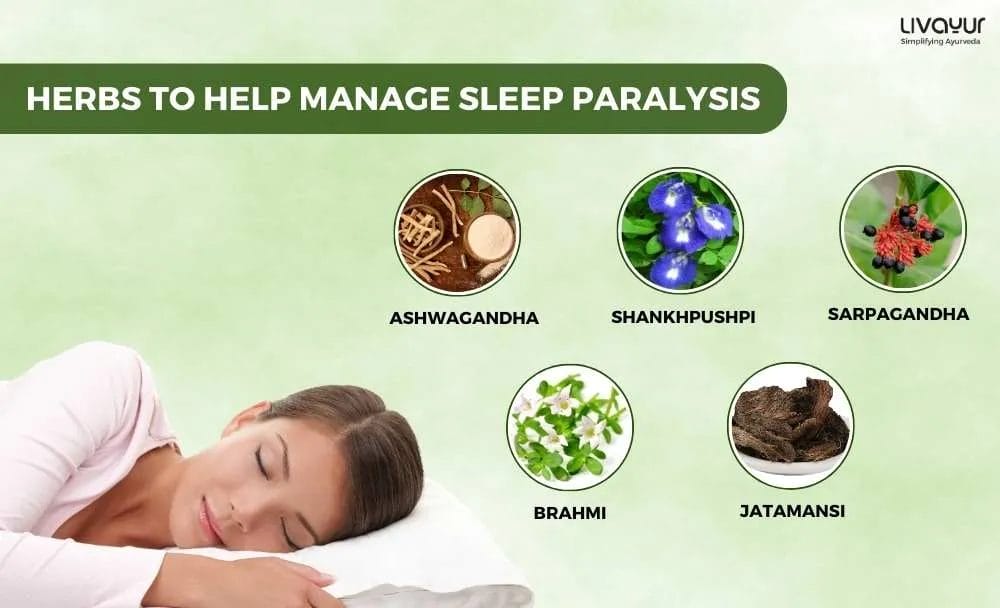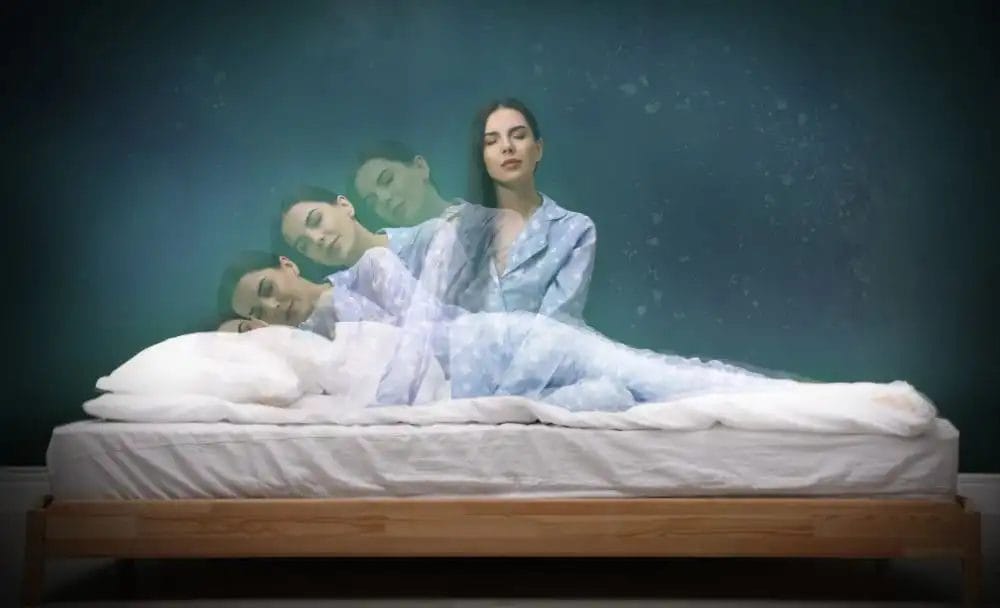This article is reviewed by experts.

Like any condition involving paralysis, sleep paralysis sounds terrifying. After all, paralysis is something that we associate with stroke disability and it is usually irreversible. However, sleep paralysis is an entirely different condition, having more to do with sleep instead. This doesn’t mean that it’s trivial or should be ignored, simply that it can be treated and managed effectively with either conventional or Ayurvedic therapies.
What Is Sleep Paralysis
Sleep paralysis is a real medical condition that affects some people during their sleep. It is the medical term for the phenomenon of being unable to move or speak when waking up or falling asleep (1). This is a temporary paralysis that can also be accompanied by severe anxiety, fear and hallucinations, making the experience terrifying.
What Causes Sleep Paralysis?
The reasons for sleep paralysis are not fully understood, but they are related to the stages of sleep and the transitions between them. Normally, when we sleep, we go through cycles of non-rapid eye movement (NREM) and rapid eye movement (REM) sleep. During REM sleep, our eyes move quickly and we have vivid dreams, but our voluntary muscles are paralyzed to prevent us from acting out our dreams. This is called atonia. (2)
Sleep paralysis occurs when there is a mismatch between the brain and the body during these transitions. For example, if the brain wakes up before the body, the person may experience atonia while being aware of their surroundings. This is called hypnopompic sleep paralysis. Alternatively, if the body falls asleep before the brain, the person may enter REM sleep while still being conscious. This is called hypnagogic sleep paralysis. In both cases, the person may experience hallucinations that are influenced by their dreams, fears or expectations.
Some factors that may increase the risk of sleep paralysis are (3):
- Narcolepsy, a neurological disorder that causes excessive daytime sleepiness and abnormal REM sleep
- Obstructive sleep apnoea, a condition that causes breathing interruptions during sleep
- Insomnia, a difficulty in falling or staying asleep
- Irregular sleep schedules, such as jet lag or shift work
- Stress, anxiety, depression, or other mental health issues (4)
- Alcohol, caffeine, drugs, or medications that affect sleep quality
- Sleeping on your back or in an uncomfortable position

Sleep Paralysis Symptoms
The symptoms of sleep paralysis include (5):
- A feeling of being conscious but not being able to control your body
- A sensation of pressure on your chest or difficulty breathing
- Hallucinations of seeing, hearing, or feeling things that are not there, such as intruders, demons, or ghosts
- Intense fear, panic, or anxiety
- A feeling of floating, flying, or being dragged out of bed
These symptoms usually occur when waking up or falling asleep. They typically last for a few seconds to a few minutes, and then disappear as the person fully wakes up or falls asleep.
Sleep Paralysis Treatment
Although sleep paralysis is itself harmless, the experience can be terrifying, increasing the severity of stress, anxiety, depression or insomnia, leading to a vicious cycle. This makes it important to understand and address the root cause of the problem, which can differ among different individuals. Because of the complexities involved, it is best to talk to an experienced Ayurvedic doctor. Until you can seek help from a medical professional, you can consider using some Ayurvedic sleep paralysis treatments at home. Here is an overview of both modern treatment and Ayurvedic treatments for sleep paralysis.
Conventional sleep paralysis treatments are aimed at improving the person’s sleep quality and reducing the frequency and severity of the episodes. Some possible treatments include:
- Reassurance and education about the nature and causes of sleep paralysis
- Sleep hygiene practices, such as having a regular bedtime and wake-up time, avoiding caffeine and alcohol before bed, and creating a comfortable and relaxing sleeping environment.
- Cognitive behavioural therapy (CBT), a type of psychotherapy that helps you identify and challenge negative thoughts and beliefs that may trigger or worsen your sleep paralysis (6)
- Antidepressants, such as selective serotonin reuptake inhibitors (SSRIs), that may help regulate your mood and your REM sleep cycle (7).
Ayurvedic therapies for sleep paralysis closely overlap with conventional treatments as the condition is recognized as a psychological imbalance that must be addressed to eliminate or relieve the symptoms. Ayurvedic sleep paralysis treatments include:
- The practice of Dinacharya (aligning with conventional sleep hygiene practices) is highly recommended to strengthen the circadian rhythm and restore a healthy sleep schedule (8).
- Patients may use meditation, Pranayamas and muscle relaxation techniques during a sleep paralysis episode to calm the mind and body. Research shows that this therapy reduced the frequency and severity of sleep paralysis in people with narcolepsy (9).
- Some herbs and supplements like Ashwagandha, Shankhpushpi, Sarpagandha, Brahmi, and Jatamansi may have sedative or relaxing effects on the nervous system, which can improve sleep quality and reduce stress to relieve sleep paralysis (10).
- Ayurvedic therapies such as Shirodhara or oil pouring can be administered at Ayurvedic clinics and have been proven to reduce both the frequency and severity of sleep paralysis episodes (11).
Conclusion
The best way to prevent or reduce sleep paralysis is to improve sleep hygiene, which includes having a regular sleep schedule, avoiding caffeine, alcohol and drugs before bed, creating a comfortable and relaxing sleeping environment, and managing stress and anxiety. If sleep paralysis is frequent or severe, it may be a sign of an underlying sleep disorder or medical condition that requires treatment. Keep in mind that many natural treatments including Ayurvedic herbs can interact with other medications because of their potency. If you suffer from any pre-existing condition or are taking any other medications, speak to your doctor before trying any other sleep paralysis treatments.
FAQs
Is sleep paralysis dangerous?
Sleep paralysis is non-threatening or dangerous, but it can be traumatic. This trauma and fear can in turn cause other psychological or physiological problems.
Can children experience sleep paralysis?
Yes, children can experience sleep paralysis, although it is more common in adults. Depending on the age of the child, treatment should be sought promptly from a pediatrician or general physician.
What tests can help diagnose sleep paralysis?
Tests like polysomnogram or multiple sleep latency test (MSLT) will not detect sleep paralysis but they will help doctors make an accurate diagnosis and can identify underlying issues like narcolepsy.
Disclaimer: The information provided here is for general information and not meant to substitute any medical advice. Please consult your doctor for appropriate medical consultation.
References:
- https://www.ncbi.nlm.nih.gov/books/NBK562322/
- https://pubmed.ncbi.nlm.nih.gov/8848973/
- https://linkinghub.elsevier.com/retrieve/pii/S1087-0792(17)30112-0
- https://www.mdpi.com/1660-4601/19/13/7821
- https://medlineplus.gov/ency/article/000801.htm
- https://irispublishers.com/ann/fulltext/cognitive-behavioral-therapy-in-the-treatment-of-recurrent-isolated-sleep-paralysis.ID.000760.php
- https://pubmed.ncbi.nlm.nih.gov/32112511/
- http://www.iamj.in/posts/2013/images/upload/86_90.pdf
- https://www.ncbi.nlm.nih.gov/pmc/articles/PMC7434831/
- https://ijapr.in/index.php/ijapr/article/view/2751
- https://ijapr.in/index.php/ijapr/article/view/1191



















